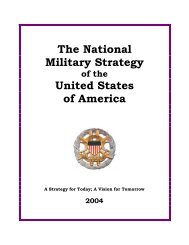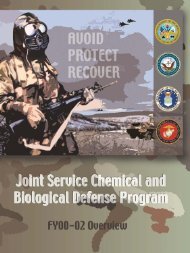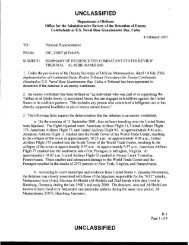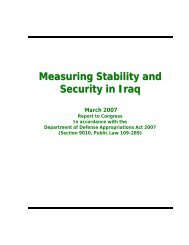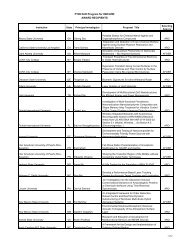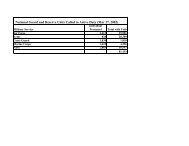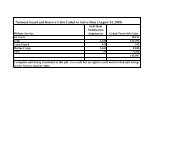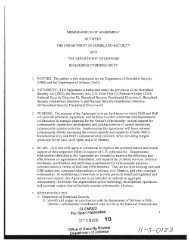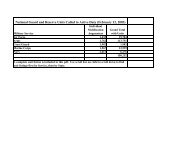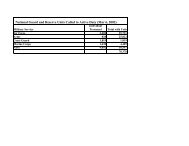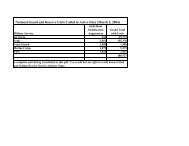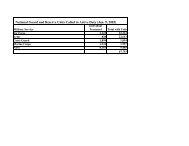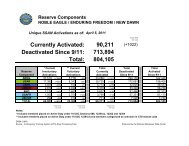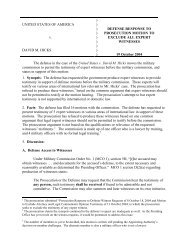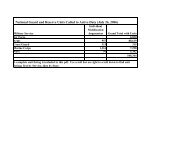Report - United States Department of Defense
Report - United States Department of Defense
Report - United States Department of Defense
Create successful ePaper yourself
Turn your PDF publications into a flip-book with our unique Google optimized e-Paper software.
UNCLASSIFIED<br />
Afghanistan’s efforts to once again become a recognized global agricultural supplier with longterm<br />
sustainability and a market-driven economy.<br />
In concert with USDA and USAID efforts, the MAIL has joined forces to support continuing<br />
transition <strong>of</strong> assets, projects, and knowledge with online reference programs affiliated with<br />
USDA and ADT’s. The program is in the initial stages and will eventually be wholly owned and<br />
managed by MAIL. In the interim, USDA is uploading and managing the knowledge transfer<br />
and responding to requests from the international community to support the program. The U.S.<br />
Embassy’s Agriculture Policy Working Group (APWG) has also begun to build a procedural<br />
draft for the benefit <strong>of</strong>, and in conjunction with, MAIL, which will eventually be a structure for<br />
all asset, project, and knowledge transfer, and prompt MAIL to be the lead in the transition<br />
process.<br />
Mining<br />
The mining industry (both hydrocarbon and extraction) is projected to be a significant source <strong>of</strong><br />
potential revenue for the Afghan government. Additionally, under the World Bank’s “Natural<br />
Resource Corridor” model, the sector could contribute to local economic growth. Under this<br />
development model, the activity surrounding a cluster <strong>of</strong> extraction mines and/or hydrocarbon<br />
fields would jumpstart economic activity up and down the corridors where the extraction occurs,<br />
such as logistical support, food services, etc. Maximizing the economic potential <strong>of</strong> the sector in<br />
this way would provide two sources <strong>of</strong> income for GIRoA: a revenue stream from the extractive<br />
industry; and business taxes from the growing private sector.<br />
Afghanistan has an adequate hydrocarbon law in place, however political issues surrounding a<br />
new mining law will need to be overcome and the law passed with its key points intact if the<br />
revenues from the minerals extraction industry are to be realized. Significant investments in<br />
infrastructure will also be needed to facilitate local economic activity and growth. Investments in<br />
the mining sector may be interrupted due to delayed passage <strong>of</strong> a new mining law. This law<br />
would link exploration and extraction rights, thus providing greater incentive for companies to<br />
invest in exploration by guaranteeing the right to extract.<br />
The Ministry <strong>of</strong> Mines (MoM) had great success in the recent tenders <strong>of</strong> four major mineral<br />
deposits. These deposits consisted <strong>of</strong> two gold and two copper deposits, and are located in Sair-<br />
Pul/Balkh Provinces, Herat Province, Ghazni Province, and Badakshan Province. Bidding<br />
opened for these tenders in August 2012, and after a selective and transparent process, the<br />
winners were selected and announced to the international community in December 2012. The<br />
MoM has begun contract negotiations with the winners <strong>of</strong> these deposits, but the contracts are<br />
not expected to be signed until after the draft mining law is passed.<br />
The Afghan hydrocarbon industry continues to mature. Currently, CNPCIW, a consortium <strong>of</strong><br />
China’s CNPC and the Afghan company Watan, is capable <strong>of</strong> producing oil in the Amu Darya<br />
Basin, but missed its production requirements for 2012 because it has not reached an agreement<br />
to sell or process the crude oil. In November 2012, the MoM announced that a consortium <strong>of</strong><br />
four companies consisting <strong>of</strong> Kuwait Energy, Dubai-based Dragon Oil, Turkey’s state-owned oil<br />
company TPAO, and Afghanistan-based Ghazanfar Group submitted a bid for two blocks in the<br />
159



